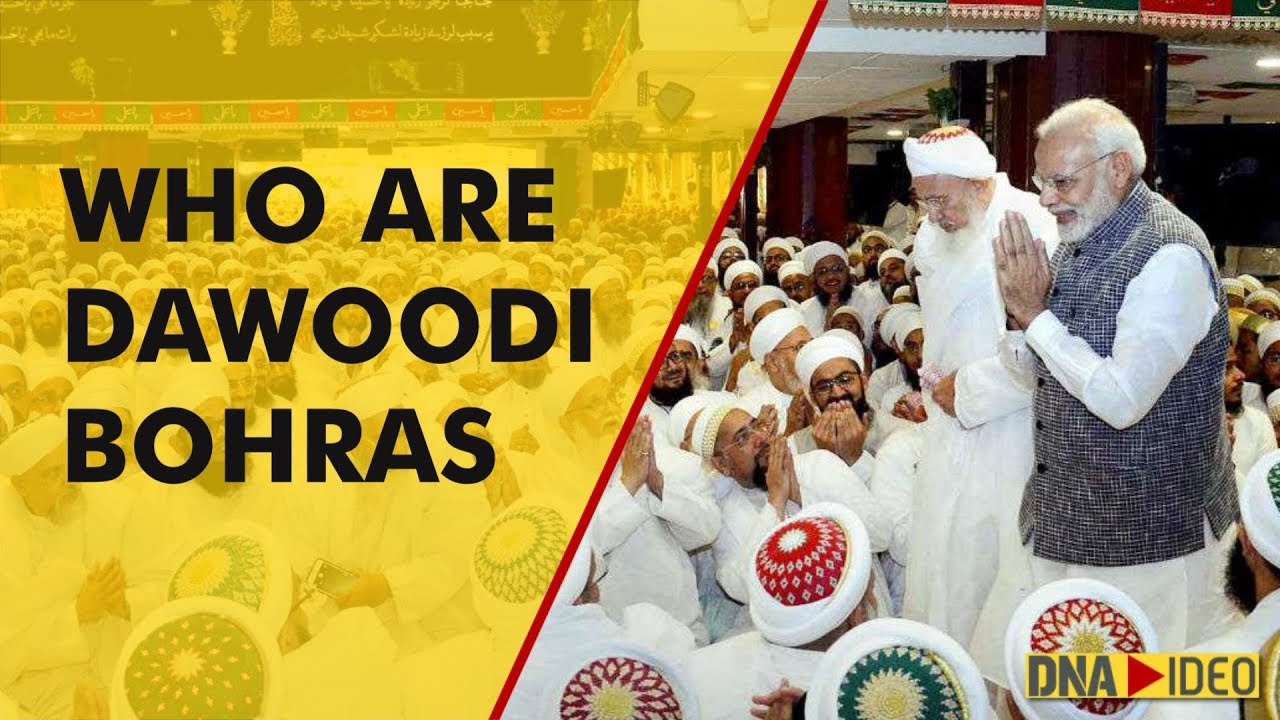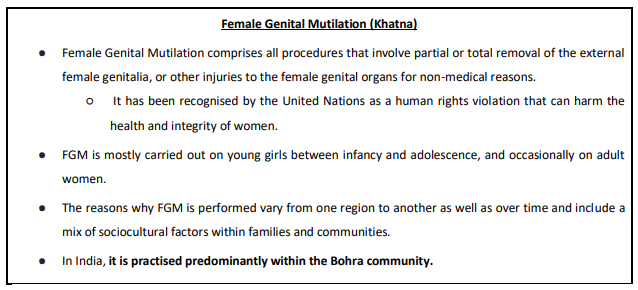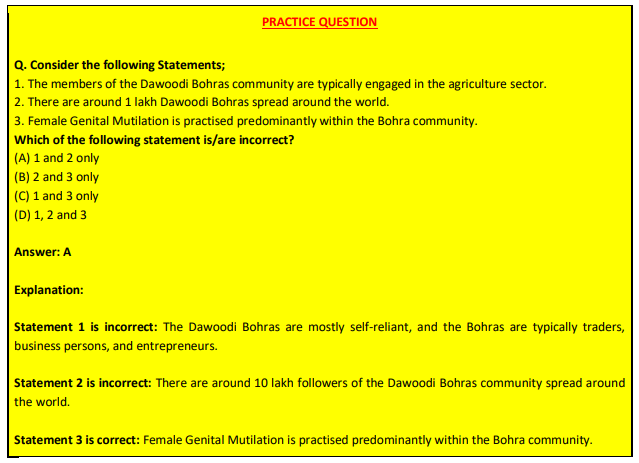Description

Copyright infringement not intended
About
- The Supreme Court of India referred a petition to a nine-judge bench. The petition challenged the constitutional validity of the practice of ‘excommunicate members’ in the Dawoodi Bohra community.
- The Supreme Court had upheld the practice in the Sardar Syedna Saifuddin v/s State of Bombay case (1962) and struck down the Bombay Prevention of Excommunication Act (1949), by highlighting that the act violated the fundamental right of a religious denomination to manage its affairs.
- Now, a Constitution bench said that the 1962 judgment needed a relook.
- The Supreme Court bench held that the review was mainly needed on two grounds:
- Balancing the rights under Article 26(b); the right of religious denominations to manage their affairs in matters of religion
- Under Article 21; whether the practice can be protected under Article 26(b) when tested on the touchstone of constitutional morality.
.jpeg)
Dawoodi Bohras
- The Dawoodi Bohras are Shia Muslims whose leader is known as the Al-Dai-Al-Mutlaq.
- They are mostly self-reliant, and the Bohras are typically traders, businesspersons, and entrepreneurs.
- The word "Bohra", in fact, comes from the Gujarati word vohrvu or vyavahar, meaning "to trade".
- According to members of the community, there are around 10 lahks Dawoodi Bohras spread around the world.
- Their largest numbers reside in India, Pakistan, Yemen, East Africa, and the Middle East.
- The leader of the Dawoodi Bohra community is recognised by the members as having the right to excommunicate its members.
- Excommunication means not being allowed to access a mosque belonging to the community or a burial dedicated to the community.

Constitutional Articles related to Freedom of Religion and educational rights
- Article 25 says that all persons are equally entitled to freedom of conscience and the right to freely profess, practice and propagate religion.
- Freedom of conscience: Inner freedom of an individual to frame his relation with God or Creatures in whatever way he desires.
- Right to Profess Declaration of one’s religious beliefs and faith openly and freely.
- Right to Practice: Performance of religious worship, rituals, ceremonies and exhibition of beliefs and ideas.
- Right to Propagate: Transmission and promotion of one’s religious beliefs to others. But, it does not include a right to convert another person to one’s religion.
- Article 25 covers religious beliefs and also religious practices (rituals).
- Article 26: Freedom to Manage Religious Affairs, every religious denomination or any of its sections shall have the following rights:
- Right to establish and maintain institutions for religious and charitable purposes.
- Right to manage its affairs in matters of religion.
- Right to own and acquire movable and immovable property.
- Right to administer such property under the law
- Article 27 - Freedom from Taxation for the Promotion of a Religion
- No person shall be forced to pay any taxes for the promotion or maintenance of any particular religion or religious denomination.
- The State should not spend the public money collected by way of tax for the promotion or maintenance of any particular religion.
- This provision prohibits the State from favouring and supporting one religion over the other. This also means that taxes can be used for the promotion or maintenance of all religions.
- This provision prohibits only the levy of a tax and not a fee.
- Article 28 - Freedom from Attending Religious Instruction
- No religious instruction shall be provided in any educational institution wholly maintained out of State funds.
- No person attending any educational institution recognised by the State or receiving aid out of State funds shall be required to attend any religious instruction or worship in that institution without his consent.
- Article 29 - Protection of Interests of Minorities
- It provides that any section of the citizens residing in any part of India having a distinct language, script or culture of its own, shall have the right to conserve the same.
- No citizen shall be denied admission into any educational institution maintained by the State or receiving aid out of State funds on grounds only of religion, race, caste, or language.
- These rights are subject to public order, morality, health and other provisions relating to fundamental rights.
- The State is permitted to regulate or restrict any economic, financial, political or other secular activity associated with religious practice.

How Draw a Line Between Matters Of Religion And Matters Other Than Religion?
- The ‘essential practice’ doctrine can be traced to a 1954 decision of the Supreme Court in Commissioner, Hindu Religious and Charitable Endowments, Madras vs. Sri Lakshmindra Thirtha Swamiar of Sri Shirur Mutt, commonly known as the ‘Shirur Mutt’ case.
- This litigation involved action sought to be taken by the Madras government against a mutt over some disputes over the handling of financial affairs.
- It was in this context that the court said: “In the first place, what constitutes the essential part of a religion is primarily to be ascertained regarding the doctrines of that religion itself.”
- However, this attempt to differentiate what essentially distinguishes a religious matter from other matters was taken up in subsequent judgments to mean that courts are required to distil the essence of religion to see whether a particular practice or act fell under the category of religion or not.
- Hence, some acts obtained constitutional protection by being declared “essential” to the practice of that religion and some were denied protection on the ground that they were not essential to it.
- In 2016, a three-judge Bench of the Supreme Court upheld the discharge of a Muslim airman from the Indian Air Force for keeping a beard.
- In Sardar Syedna Taher Saifuddin Saheb vs. Bombay (1962), the Supreme Court struck down a law that prohibited the head of the Dawoodi Bohra community from excommunicating members.
- The majority ruled that the power of excommunication exercised by the religious head on religious grounds was part of the management of affairs on religious matters, and the Act infringed on the community’s rights.
- In the Sabarimala case (2018), the majority ruled that the bar on entry of women in the age group of 10 to 50 was not an essential or integral part of the religion, and denied the status of a separate religious denomination of devotees of Lord Ayyappa.
Way forward
- The Law Commission in its report mentioned that ‘Cultural diversity Cannot be Compromised to the extent that our urge for uniformity itself becomes a reason for threat to the unity and integrity of the nation’.
- The difference does not always imply discrimination. Diversity, both religious and regional Should not be Subsumed under the louder voice of the majority.
- Codification of all religious laws is necessary to avoid controversies related to what is and what is not essential religious practices under the Right to freedom of religion guaranteed by the Indian Constitution.


https://indianexpress.com/article/india/excommunication-dawoodi-bohra-supreme-court-8436450/






.jpeg)







